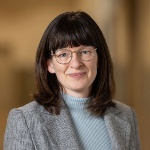"Extremely energy-intensive computing operations run in the background of AI tools. As artificial intelligence is being used more and more frequently and in more and more areas, the power requirements of data centers are increasing rapidly," says Dr. Markus Grözing from the Institute of Electrical and Optical Communications (INT) at the University of Stuttgart.
Together with his team members, Jakob Finkbeiner and Raphael Nägele, he has developed an analog computing circuit concept that significantly reduces both the energy requirements and the chip area needed for multiplication and addition operations. In booming AI applications such as ChatGPT, these basic computing operations must be carried out billions of times to calculate so-called artificial neural networks.
New analogue computing circuit concept optimizes the energy consumption of AI computing operations
In conventional digital arithmetic units, many hundreds of components, so-called field-effect transistors, are generally used for the simple multiplication of two numbers and are recharged for each calculation. This consumes a lot of energy. "In our analog concept, multiplication is performed with just two field-effect transistors in which a current flows for only a very short moment. No additional component is required for addition," says Grözing. "So far, our research indicates that analog multiplication with the new technology is about a hundred times more energy efficient than an already greatly reduced and optimized digital FP4 multiplication on the latest Nvidia AI accelerator generation."
The Future Prize
The team has now been awarded the Ewald Marquardt Private Foundation's Future Prize for its promising approach. The prize of 10,000 EUR is being awarded for the ninth time this year. This prize is awarded every two years and honors pioneering ideas and innovations in the field of electrical switching, control and regulation technology. The jury noted that, more than ever before, the projects submitted this year showed that successful innovations in this area can change entire areas of life and work systems today.

The AKIPROP project: Fast and efficient analog processor for AI accelerators and optical data links
Dr. Markus Grözing, Jakob Finkbeiner and Raphael Nägele are conducting research at the University of Stuttgart as part of the AKIPROP project. The project is investigating the use of fast and energy-efficient electronic analog computing circuits in artificial neural networks for AI accelerators and in transmitters and receivers of optical data transmission connectors to compensate for linear and non-linear distortions.
Every year, numerous researchers at the University of Stuttgart are honored for groundbreaking and creative achievements. A selection of our award winners.
How can doctoral students, postdocs and professors receive recognition for their research? An overview of the prizes on offer [de].
Expert Contact:
Dr. Markus Grözing, Institute of Electrical and Optical Communications, Tel: 0711 685 67921, email
Jakob Finkbeiner, Institute of Electrican and Optical Communciations, Tel: 0711 685 67899, email
Raphael Nägele, Institute of Electrical and Optical Communications, Tel: 0711 685 69191, email
Contact

Lena Jauernig
Editor Research / Early Career Researchers


